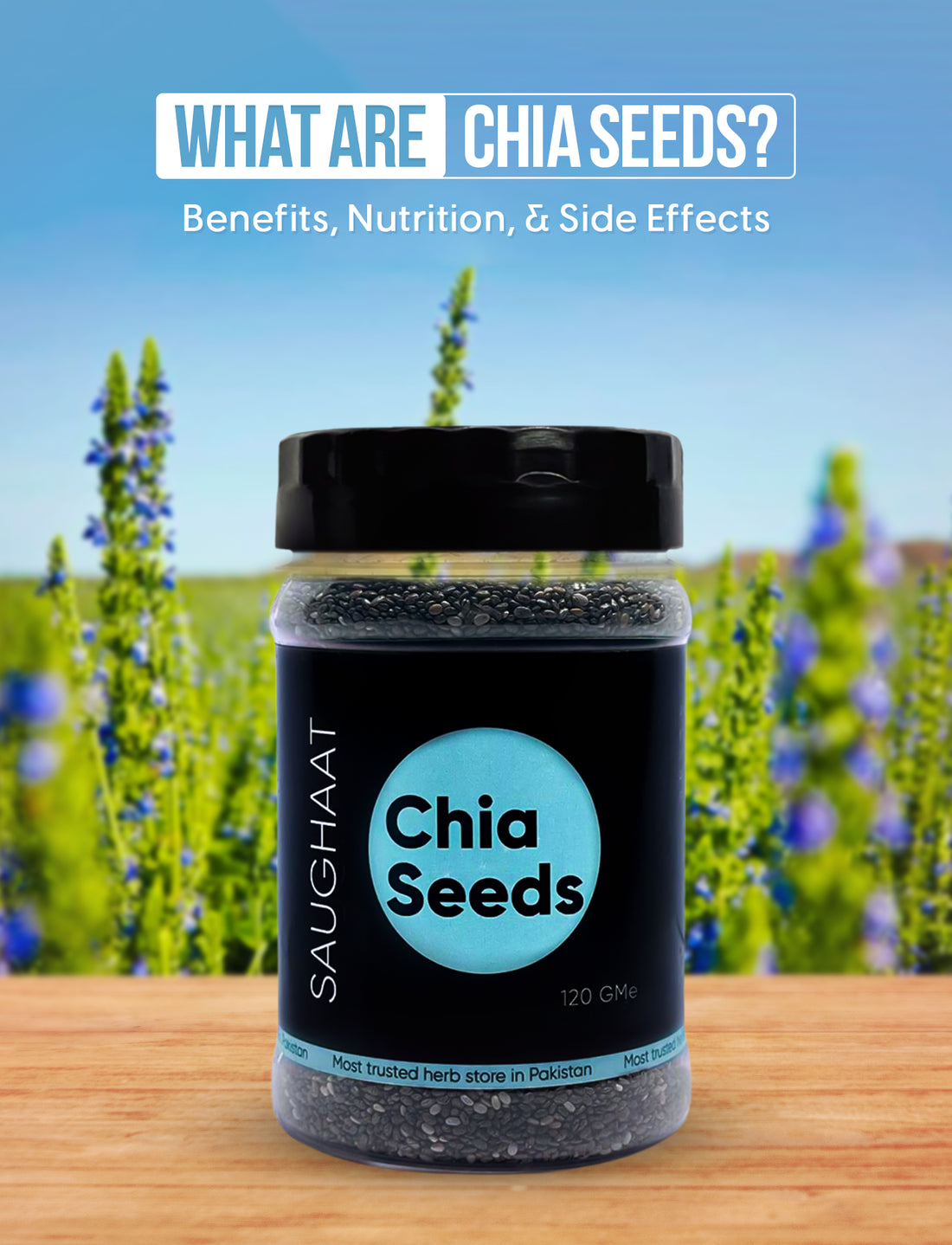
What are Chia seeds? Benefits, Nutrition, and Side Effects
Share
Have you ever heard about any seeds that have a plethora of benefits and no side effects on health?
Chia Seeds are black or white tiny seeds full of nutrients good, derived from a plant named Salvia hispanica. This versatile food is known for its incredible nutritional value and medicinal value. These are originated from Aztec and Mayan cultures and have been popularly used for centuries. However, they have gained more popularity now that people know more about their benefits for gut health, heart health, weight management, and more.

Chia Seeds Nutrition facts
- Sodium: 4.5 milligrams
- Carbohydrates: 11.9 g
- Fiber: 9.8 g
- Protein: 4.7 g
- Phosphorus: 244 mg, or 35% of the DV
- Iron: 2.19 mg, or 27% of the DV
- Fat: 8.7 grams
- Magnesium: 95 mg, or 23% of the DV
- Calcium: 179 mg, or 18% of the DV
- Zinc: 1.3 mg, or 12% of the DV
Health Benefits of Chia Seeds
- Reducing blood pressure
Hypertension is the leading disease worldwide. Omega-3 fatty acids help thin the blood and regulate normal blood pressure. Consuming a moderate amount regularly helps maintain normal blood pressure, which automatically puts you on the right path to a healthy journey.
-
Reduce the risk of Cardiovascular Diseases
Omega 3 fatty acids are the best fats for achieving optimal health.
Omega-3 fatty acids also help lower the risk of coronary heart disease and lower triglycerides.
Accoridng to some analysis. , it also contain alpha-linolenic acid (ALA), if consumed on a regular basis, lowers the risk of cardiac events by 10%. Moreover, ALA reduces cholesterol, LDL, and triglyceride levels, ultimately reducing the risk of cardiovascular diseases.
-
Aiding in weight management
When it comes to weight loss, make chia seeds your best friend. They show remarkable results in maintaining and shedding extra pounds. When mixed with water, it swells up and takes up space in the Stomach. In return, you will not feel hungry and will stay full for a longer time.
According to some studies, researchers experiment on rats by giving them chia seeds. Rats who were fed these seeds lose visceral fats compared to those who were not given them.
-
Reducing inflammation and free radicals
According to the National Cancer Institute [1], free radicals are damaging molecules that harm body cells and improve oxidative stress. They disrupt major molecules like DNA, proteins, and lipids, increasing the risk of cancer and other serious diseases. The versatile superfood contains major antioxidants, which help to reduce the inflammation and damage caused by free radicals. It contains quercetin, myricetin and ceffeic.
Quercetin is a dominant antioxidant that combat oxidative stress and protects cells from damage. Experts advise taking quercetin-rich food like chia seeds to add to your daily diet in a moderate amount. Because they have the ability to slow down the aging process.
-
Regulate Blood Sugar Level
The fibre, protein, and omega-3 fatty acids act as natural buffers to curb the breakdown of carbohydrates. These help to slow down the digestion process and the breakdown of carbohydrates into sugar before going into the bloodstream. Omega-3 fatty acids increase insulin sensitivity by reducing insulin resistance and blood glucose levels.
-
Chia Seeds benefit for Stomach and Gut
These plant-sourced protein source seeds contain soluble and insoluble fibres, which are beneficial for promoting good gut health. The soluble fibers and polyphenols act as pre-biotics to feed gut good microbes and protect the intestinal lining.
Chia seeds have amazing stomach benefits, as they form a gel-like substance when mixed with water and slow down the digestion process. Moreover, they help form stool and prevent constipation.
How to use Chia seeds
- Salvia Hispanica can be incorporated in various ways. From salads to savory dishes to desserts, they can be easily added to any dish.
- You can add it to your breakfast oatmeals, cereals, crepes, chia seed pudding, and smoothie bowls. It is easily blended with smoothies and other meals.
- You can also add it to yogurt and sprinkle it on any salad to give it a crunchy twist.
- These nutrient-rich seeds can easily be incorporated into any drink or beverage. When mixed with water, they form a gelatinous coating and become bigger in size. People most like their gel-like consistency.
- They can be added to any dessert, maximizing its volume and providing a great taste.
These superfoods are perfect for diet-conscious people and are ideal for adding to any low-carb and keto diet.
- Keto Chia Pudding
- Creamy Chocolate Keto Pudding
- Low-carb Chia crackers
- Keto Chia meatballs
How much Chia seeds can be consumed per day?
Appropriate amounts can vary from person to person's needs and purpose. The average recommended daily consumption of chia seeds is one to two tablespoons (10 to 15 grams).
Chia Seeds Side Effects
The edible seeds from the mint family are highly beneficial from every perspective and do not have any dominant side effects. However, an excess of anything can harm in any way, so some precautionary measures are necessary to avoid any effects.
Chia seed water has an effective hydration effect but cannot be replaced with natural plain water. Moreover, if taken in excess amount also disturb gastrointestinal system and can cause bloating, irritable bowel syndrome, gas or blockages. An appropriate amount is enough daily for maximum benefits.
Some people face difficulty with a gel-like consistency and may feel trouble swallowing it.
Conclusion
Salvia Hispanica is tiny seeds that form gel-like when mixed with water, and they contain major antioxidants, fiber, and vitamins. Chia seeds have immense benefits for stomach, gut health, maintaing weight, blood sugar level and reduces risks of cardiovascular diseases. These can be easily added to any recipe or drink. Regular consumption will show many positive effects in human health. But before adding to your diet, consult your healthcare professional to avoid any complications.

